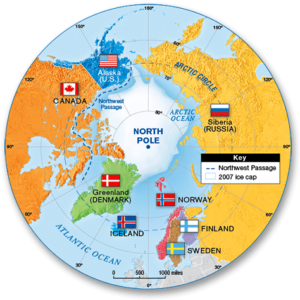India’s Arctic Policy

Copyright infringement is not intended
Context: India's Arctic policy titled 'India and the Arctic: building a partnership for sustainable development’ launched.
About India's Arctic policy:
- India's Arctic policy would play an essential role in preparing the country for a future where humankind's biggest challenges, like climate change.
- Implementing India's Arctic policy will involve multiple stakeholders, including academia, the research community, business, and industry
- India's Arctic policy shall be implemented through an action plan, and an effective governance and review mechanism involving the inter‐ministerial Empowered Arctic Policy Group.
- India's Arctic policy aims to promote the following agenda—
- Strengthening national capabilities and competencies in science and exploration, climate and environmental protection, maritime and economic cooperation with the Arctic region. Institutional and human resource capacities will be strengthened within Government and academic, research and business institutions.
- Inter-ministerial coordination in pursuit of India's interests in the Arctic.
- Enhancing understanding of the impact of climate change in the Arctic on India's climate, economic, and energy security.
- Contributing better analysis, prediction, and coordinated policymaking on the implications of ice melting in the Arctic on India's economic, military and strategic interests related to global shipping routes, energy security, and exploitation of mineral wealth.
- Studying linkages between polar regions and the Himalayas.
- Deepen cooperation between India and countries of the Arctic region under various Arctic forums, drawing expertise from scientific and traditional knowledge.
- Increase India’s participation in the Arctic Council and improve understanding of the complex governance structures in the Arctic, relevant international laws, and geopolitics of the region.
- The National Centre for Polar and Ocean Research (NCPOR) in Goa, an autonomous institute under the Ministry of Earth Sciences, is the nodal institution for India’s Polar research programme, which includes Arctic studies.
India and Arctic region:
- India has a significant stake in the Arctic.
- It is one of thirteen nations holding Observer status in the Arctic Council, a high-level intergovernmental forum that addresses issues faced by the Arctic governments and the indigenous people of the Arctic.
- The country maintains that all human activity should be sustainable, responsible, transparent, and based on respect for international laws.
- In 2014 and 2016, India's first multi-sensor moored observatory in Kongsfjorden and the northernmost atmospheric laboratory in Gruvebadet, Ny Alesund, were launched in the Arctic region. Until 2022, India has successfully conducted thirteen expeditions to the Arctic.
About Arctic Council
- The Arctic Council is a high-level intergovernmental forumthat addresses issues faced by the Arctic governments and the indigenous people of the Arctic.
- The eight countries with sovereignty over the lands within the Arctic Circle constitute the members of the council: Canada, Denmark, Finland, Iceland, Norway, Russia, Sweden, and the United States.
- Outside these, there are some observer states.
- The 1996 Ottawa Declarationestablished the Arctic Council as a forum for promoting cooperation, coordination, and interaction among the Arctic states, with the involvement of the Arctic Indigenous communities and other Arctic inhabitants on issues such as sustainable development and environmental protection.
- Observer status is open to non-Arctic statesapproved by the Council at the Ministerial Meetings that occur once every two years. Observers have no voting rights in the Council.
https://www.pib.gov.in/PressReleasePage.aspx?PRID=1806993



1.png)
